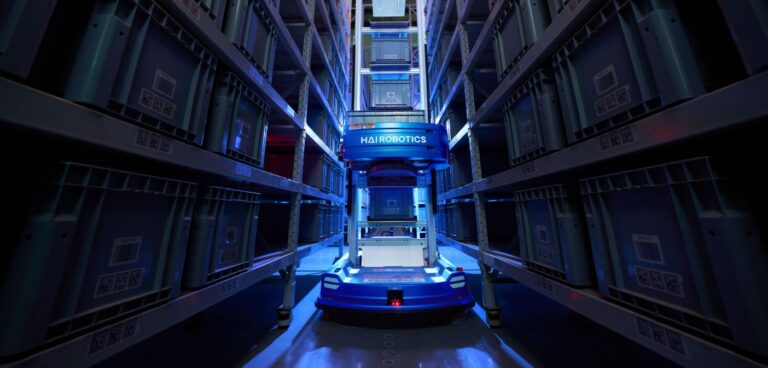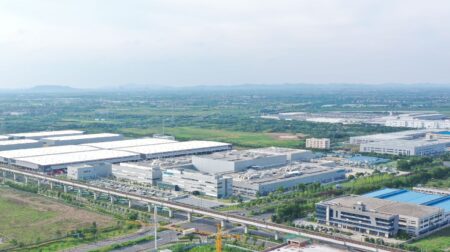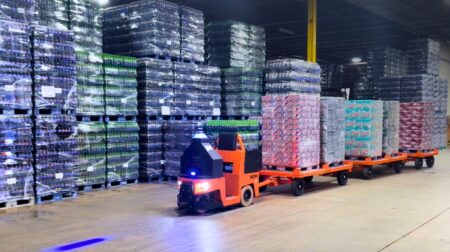In late 2021 Winit, a Chinese cross-border warehouse operator, began a partnership with Robotics and Automation 2022 exhibitor and provider of autonomous case-handling robotic systems for warehouse logistics, Hai Robotics.
About 100 robots were deployed at Winit’s warehouse near Birmingham, travelling around the more than 30,000m² (322,917ft²) warehouse to help workers pick and sort goods.
As a result, the goods-handling efficiency for the Winit warehouse has reportedly improved three- to four-times more than manual work, with a daily handling volume of up to 50,000 pieces.
“With the robotic system we make less mistakes,” said Christopher Calderhead, who has 12 years of warehousing experience and currently works in a Winit warehouse. “Because there are clear instructions for each action and when we pick wrong goods the system blocks it.
“And an easy-to-handle process is in place when something unusual happens. The system saves a lot of manual efforts.”
The total size of Winit’s warehouses abroad is about 399,400m² (429,9105ft²), which totals the size of 56 football pitches. It operates three UK-based warehouses, the total size of which reaches 50,000m² (538,195ft²).
The company has faced challenges during the past two years as the demand for global warehousing services surged dramatically.
Custom statistics indicate that, in 2021, Chinese cross-border trade volume amounted to CN¥1.98tn (£246.2bn), up 15% compared to 2020. This volume is expected to reach CN¥2.5tn (£310.9bn) by 2025.
One issue for Winit was the large amount of SKUs owned by different merchants, which raised concerns about warehouse storage density and picking efficiency.
To address this, the company approached Hai Robotics to support the automation of its order fulfilment centre operations; Hai Robotics then customised a solution plan for Winit.
The warehouse automation project provided 120,000 storage locations with a shelving height of 4.3m (14.1ft) in a 10,000m² (107,639ft²) warehouse in Staffordshire.
Hai Robotics’ plans included the deployment of 100 HAIPICK A42 robots and 16 on-conveyor picking workstations in the warehouse, claiming that automated storage and retrieval functions help the average efficiency of the site reach 450 cases per hour.
Soaring demand means flexible warehousing solutions are increasingly important for cross-border warehouse owners. Winit said it found Hai Robotics’ solution a suitable match for the needs of high storage density, goods-handling accuracy, operation efficiency and flexibility.
Bob, who is in charge of the warehouse, said: “These smart robots have well met our expectations. So far, Winit has helped more than 3,000 Chinese cross-border merchants export to the UK.
“We picked Hai Robotics as our autonomous robot supplier among several other companies because it is one of the first developers. Its system has better stability than that of others, and its staff is professional, so we chose them.”
After the project went live, Winit saw its warehouse throughput spike, which accommodated its growing order fulfilment requests for cross-border warehousing and logistics from merchants around the world.
The solution has reportedly improved storage density by 60% and picking efficiency by 50% in the warehouse with over 100,000 SKUs. The current on-time delivery of Winit is almost 100%.
What’s more, implementation of the HAIPICK system has enabled Winit to continually provide on-time delivery and ensure order completion. So far, the company has helped more than 20,000 Chinese merchants to export their goods to the USA, the UK, Australia and several European countries.
The solution also supports a significant reduction in labour costs by both mitigating the need to hire new employees to perform repetitive and labour-intensive tasks and improving the speed and accuracy of work.
Bob said: “The labour shortage in the UK is particularly apparent now. Brexit and the Covid-19 pandemic have had dire consequences for the warehouse and logistics sector. Experienced employees are leaving and it’s hard to fill in new ones. As a result, our labour cost, in response, surged too.”
This shortage has led to delivery issues for customers, loss of income for employers and knock-on effects for those working in warehouses. The robotic solution offered an opportunity for staff to focus on more strategic tasks and to retrain and upskill.
Becky, a warehouse staff member, said that robots supported her to stay in the workstation and wait for machines to pick and carry materials back and forth. This helped to stop pain in her waist.
“Getting the goods now is like getting something at my fingertips, they make my work much easier,” she said. “Now I don’t need to move around and bend my waist.
“And when I got home after work, I still felt my energy and could eventually spend some valuable time with my children. My family is so happy about it!”
Hai Robotics (Stand 510) will be at Robotics and Automation 2022 on 01-02 November at the Coventry Building Society Arena. For more information on this unmissable industry event, please visit www.roboticsandautomation.co.uk









